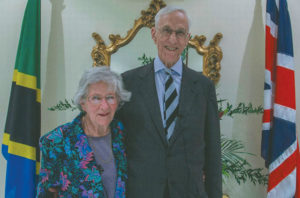by Ben Taylor
BTS Vice President and former BTS Chair, Ron Fennell, passed away peacefully on April 12th, attended by family. He and his wife, the late Liz Fennell MBE, had a great love for Tanzania and were stalwarts of the Society, including providing substantial support to the work of the Tanzania Development Trust.
Ron and Liz met in 1950 while both were studying geography at Cambridge University and they married in 1956. He worked in Sierra Leone for 12 years until 1966, when he joined the International Monetary Fund and moved to Washington, DC. He joined the World Bank three years later and the family lived first in Nigeria and then Tanzania, where Ron served as the World Bank’s Resident Representative for four years, before returning to the United States in 1987. They retired to the UK in 1995, settling in West London.
Thereafter, Ron and Liz were active members of BTS known in particular for their energetic support to the Society at events and to TDT where they would take long trips to Tanzania to assess and support projects, at their own cost and even to the most remote areas.
Writing in 2000 about his time in Tanzania, Ron wrote: “When I was sent to Dar as World Bank Resident Representative in January 1984, the Bank’s Senior Vice President made it clear to me that all Bank lending to Tanzania would stop after the approval of the Mtera Power Project in early 1984 unless the government entered into a more active dialogue with the World Bank on economic reform. Times were hard. People were suffering. The picking of tea in the Mufindi plantations fell behind because the women pickers were unable to get sugar to put in their own morning tea, which constituted their main source of energy in the fields. There was a severe shortage of basic consumer goods.”
It was an unpromising situation to be facing, and the negotiations between the government and the World Bank were at times highly strained. Tensions were also high between reformists and traditionalists within the government and ruling party – this was after all, the same period that saw President Julius Nyerere step down.
The World Bank’s insistence that policy change should come before Bank funds were released weighed heavily on Finance Minister Msuya. Nevertheless, agreement was reached, in the form of a Structural Adjustment Programme, which Nyerere accepted as necessary.
“There is no doubt that mistakes had been made by both sides,” wrote Ron. “The Bank itself went through major changes in its approach to development assistance over the period,” and Nyerere “was slow to recognise that parastatal inefficiencies were having such a detrimental impact on peasant farmers. … He refused to accept the need to devalue the shilling until donor consensus and the parlous state of the economy made it unavoidable.”
These reforms, and the Bank’s role, are still somewhat contentious in Tanzania. Researchers like Prof Ruth Meena have repeatedly said that World Bank/IMF-driven structural adjustment programmes undermined development in health and education. It was a difficult time for the population, as the government reduced spending on public services and introduced cost-sharing for schooling and health services, price controls were lifted and the shilling was devalued. And yet few would dispute that the state of the economy necessitated major changes.
Despite these challenges, Ron maintained good relations with his counterparts in the Tanzanian government, later commenting that the friendliness of the people, the stable political environment and a commitment to consensus building, made it possible to work through the difficulties. And his ongoing work in Tanzania after his retirement amply demonstrates the fondness he felt for the country.
Ron and Liz were both made MBEs in the 2013 New Year’s Honours list for services to building relations between the UK and Tanzania. “We are thrilled,” said Ron at the time. “It is nice that we both got one because we have worked as a team for many years.”

